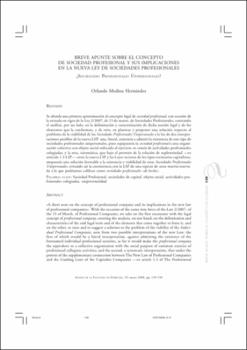Breve apunte sobre el concepto de sociedad profesional y sus implicaciones en la nueva Ley de sociedades profesionales
Fecha
2008Resumen
Se aborda una primera aproximación al concepto legal de sociedad profesional, con ocasión de
la entrada en vigor de la Ley 2/2007, de 15 de marzo, de Sociedades Profesionales, centrando
el análisis, por un lado, en la delimitación y caracterización de dicha noción legal y de los
elementos que la conforman, y de otro, en plantear y proponer una solución respecto al
problema de la viabilidad de las Sociedades Profesionales Unipersonales a la luz de dos interpretaciones
posibles de la nueva LSP: una, literal, contraria a admitir la existencia de este tipo de
sociedades profesionales unipersonales, pues equipararía la sociedad profesional a una organización
colectiva con objeto social enfocado al ejercicio en común de actividades profesionales
colegiadas; y la otra, sistemática, que bajo el pretexto de la relación de supletoriedad —ex
artículo 1.3 LSP— entre la nueva LSP y las Leyes rectoras de los tipos societarios capitalistas,
ampararía una solución favorable a la existencia y viabilidad de estas Sociedades Profesionales
Unipersonales, evitando así la coexistencia con la LSP de una especie de zona muerta reservada
a lo que podríamos calificar como sociedades profesionales «de hecho». With the occasion of the come into force of the Law 2/2007, of
the 15 of March, of Professional Companies, we take on the first encounter with the legal
concept of professional company, centring the analysis, on one hand, on the delimitation and
characteristics of the said legal term and of the elements that come together to form it, and
on the other, to raise and to suggest a solution to the problem of the viability of the Individual
Professional Companies, seen from two possible interpretations of the new Law: the
first of which would be a literal interpretation, against admitting the existence of the
forenamed individual professional societies, as for it would make the professional company
the equivalent to a collective organization with the social purpose of common exercise of
professional collegiate activities; and the second, a systematic interpretation, that under the
pretext of the supplementary connection between The New Law of Professional Companies
and the Guiding Laws of the Capitalist Companies —ex article 1.3 of The Professional Companies Law—, would be in favour of the existence and viability of the Individual
Professional Companies, and like this avoiding the coexistence of the Law with a sort of dead
zone made for what we might call «of fact» Professional Companies.






